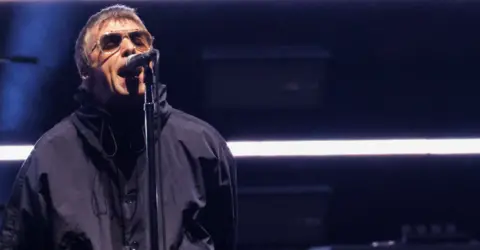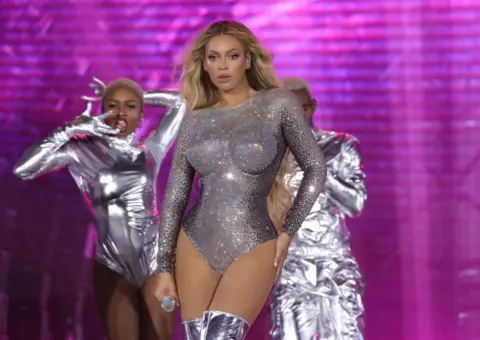Ticketmaster agrees to better price information after Oasis complaints
18 minutes agoChi Chi IzunduInvestigations correspondent andMark SavageMusic correspondent

 Reuters
ReutersTicketmaster will have to give music fans more advance information about ticket prices, after complaints about the system used for Oasis’s reunion tour last year.
The Competition and Markets Authority says the company has agreed to tell fans 24 hours in advance if a tiered pricing system is being used, as it was for Oasis standing tickets, and give more information about ticket prices during online queues.
It comes after the CMA said Ticketmaster “may have misled Oasis fans” with unclear pricing last year.
Platinum tickets sold for almost two-and-a-half times the standard price, but Ticketmaster did not explain to consumers that they came without extra benefits.
Fans expressed outrage over allegations that Ticketmaster used “dynamic pricing” – where ticket prices rise and fall according to demand – prompting the CMA to launch an investigation into the sale.
However the CMA said it had “not found evidence” that such an algorithmic pricing system had been used to adjust the price of Oasis tickets in real time.
As a result of the investigation, Ticketmaster will have to provide more information about prices during online queues, helping fans anticipate how much they might have to pay.
It will also have to use accurate labelling, to ensure the site does “not give the impression that one ticket is better than another when that is not the case”, the CMA said.
The company will also have to regularly report to the CMA over the next two years to ensure it is adhering to the new compliance.
“Fans who spend their hard-earned money to see artists they love deserve to see clear, accurate information, upfront,” said CMA chief executive Sarah Cardell.
“If Ticketmaster fails to deliver on these changes, we won’t hesitate to take further action.”
A spokesperson for Ticketmaster said in a statement: “We welcome the CMA’s confirmation there was no dynamic pricing, no unfair practices and that we did not breach consumer law.
“To further improve the customer experience, we’ve voluntarily committed to clearer communication about ticket prices in queues.
“This builds on our capped resale, strong bot protection, and clear pricing displays – and we encourage the CMA to hold the entire industry to these same standards.”

 Getty Images
Getty ImagesThe watchdog’s action comes as Ticketmaster and its parent company Live Nation face legal action in the US over allegations they allowed brokers to buy up millions of dollars of tickets and resell them at higher prices.
The lawsuit was filed in California by the Federal Trade Commission and seven US states, and accused Ticketmaster of deceptive practices, including advertising lower prices that were actually unavailable.
The lawsuit also alleged that, in one instance, a broker had been able to purchase more than 9,000 tickets for a single concert during Beyoncé’s 2023 Renaissance tour.
When some of those tickets were resold on Ticketmaster at a higher price, the company was able to collect additional fees, the lawsuit alleged.
Ticketmaster and Live Nation have yet to respond.
Meanwhile, Live Nation’s CEO Michael Rapino has said he thinks concert tickets are underpriced.
Speaking at the Game Plan conference in Los Angeles last week, Rapino compared rock and pop shows to sporting events, telling Rolling Stone: “In sports, I joke it’s like a badge of honour to spend $70,000 for a Knicks courtside [seat],” but “they beat me up if we charge $800 for Beyoncé.”
The average price of a concert ticket rose 23.3% globally last year, according to data from the live industry trade publication Pollstar, reaching a record high of $130.81 (£104.36).
But Rapino said there was “a lot of runway left” in terms of price increases.
“When you read about ticket prices going up, the average concert price is still $72. Try going to a Laker game for that, and there’s 80 of them. The concert is underpriced and has been for a long time.”